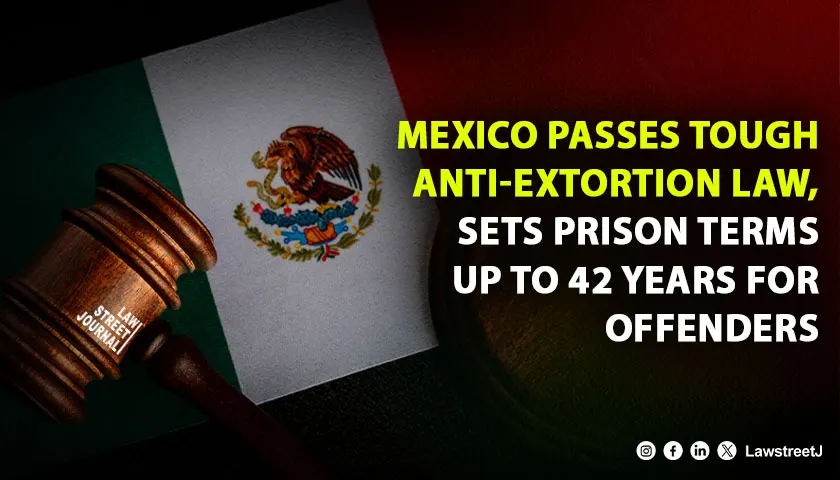Mexico: Mexico has enacted a sweeping new anti-extortion law introducing prison sentences of up to 42 years for individuals involved in extortion-related crimes. The legislation, approved by Congress on Tuesday, represents one of the toughest legal responses to organized crime in recent years and follows a surge in nationwide extortion cases.
Mexico’s Chamber of Deputies ratified the bill after the Senate voted overwhelmingly in its favor earlier this month. The reform modifies Article 73 of the Mexican Constitution, granting federal authorities the power to issue a General Law Against Extortion. This new legal framework standardizes how extortion is defined and prosecuted across all 32 Mexican states, where penalties and classifications previously differed.
Under the new law:
- Extortion becomes a federal crime, enabling centralized investigations and uniform prosecution.
- Sentences range from 10 to 42 years, depending on the severity of the offense and the involvement of public officials.
- Public officials who fail to report extortion can face 10 to 20 years in prison.
- Prison officials or staff who permit or facilitate extortion may receive 15 to 25 years.
- Anonymous reporting mechanisms are established to encourage victims to come forward without fear.
The legislation also requires authorities to initiate investigations ex officio, removing the earlier requirement for victims to file a complaint. Lawmakers argue that this measure will reduce case attrition and improve prosecution rates, especially in regions where fear of retaliation often deters victims from reporting crimes.
Rising Crime Rates Prompt Urgent Legislative Action
The passage of the bill comes amid rising extortion rates nationwide. Official crime data shows that extortion cases increased by 7% during the first half of 2025. Between January and June, authorities registered 5,887 victims, marking one of the highest recorded levels in recent years.
President Claudia Sheinbaum, who took office in 2024, has publicly stated that extortion remains the only major crime category her administration has not yet succeeded in reducing. Her government has identified the new law as a key element of its broader public security strategy.
Extortion schemes in Mexico often involve coercion, intimidation, and demands for “protection” payments from individuals and businesses. Small business owners, transport workers, and families in high-risk areas are frequently targeted. Criminal groups have been known to operate these schemes both inside and outside the prison system. Lawmakers say the strengthened penalties aim to dismantle these networks and curb the influence of organized criminal groups that rely on extortion as a primary source of income.
Institutional Challenges and Implementation Needs
Legal analysts consider the reform a major shift in Mexico’s approach to combating organized crime. By establishing a unified legal standard and elevating extortion to a federal offense, the law seeks to close enforcement gaps caused by previously inconsistent state-level definitions and penalties.
However, experts note that the law’s effectiveness will depend on the ability of federal and state institutions to coordinate investigations and share intelligence. Implementation will require expanded investigative resources, improved training for law enforcement personnel, and oversight mechanisms to ensure compliance.
The provision that imposes penalties on public officials highlights lawmakers’ concerns about institutional complicity. Investigations in recent years have revealed multiple instances where extortion schemes were facilitated by corrupt officials or carried out within penitentiary facilities. The law’s penalties are designed to address these vulnerabilities by holding state actors accountable.
The reform also aligns with Mexico’s obligations under international conventions on human rights and anti-corruption, including measures designed to strengthen due process, protect victims, and ensure transparent judicial procedures.









